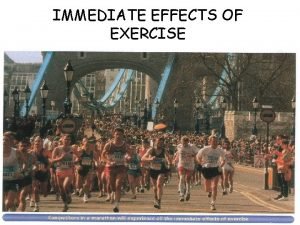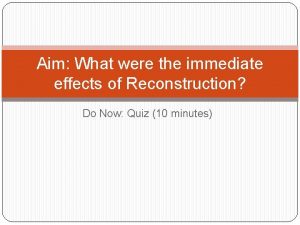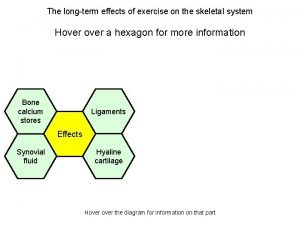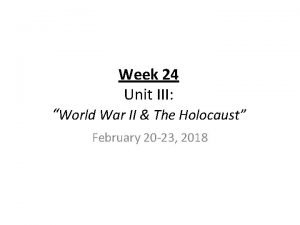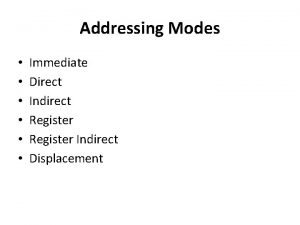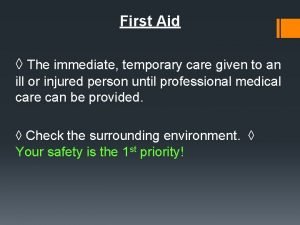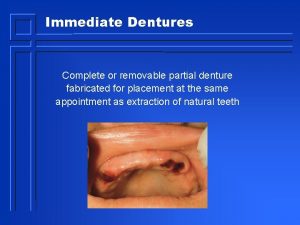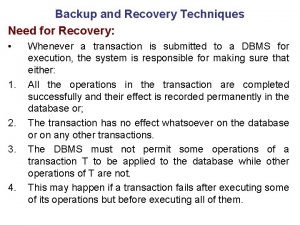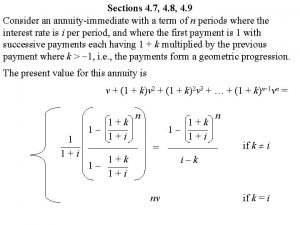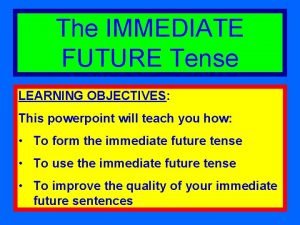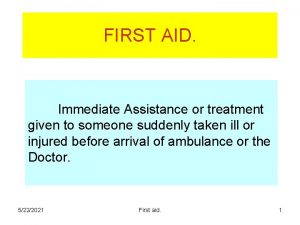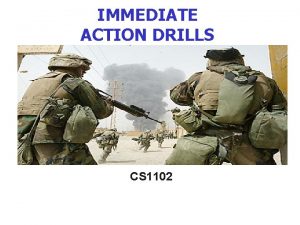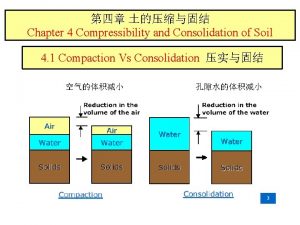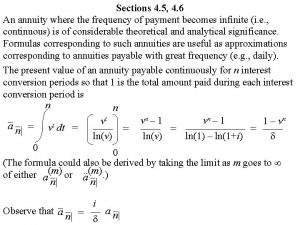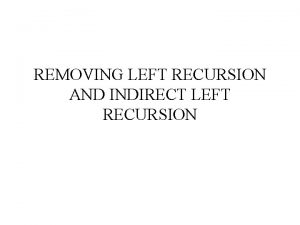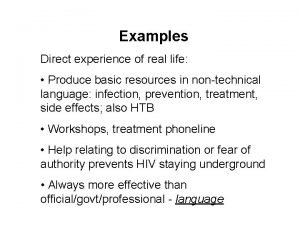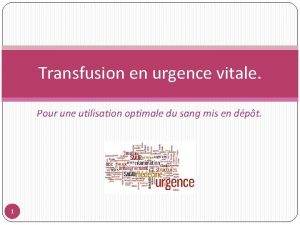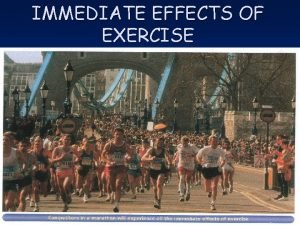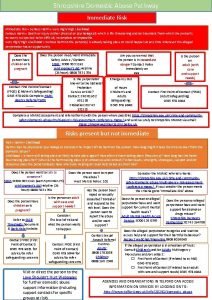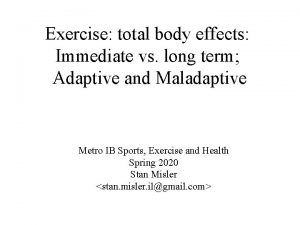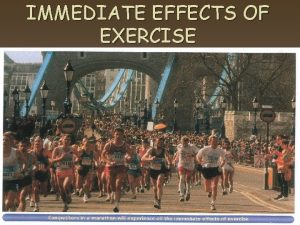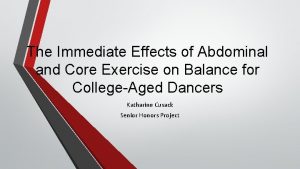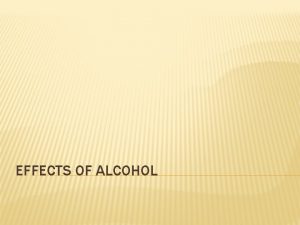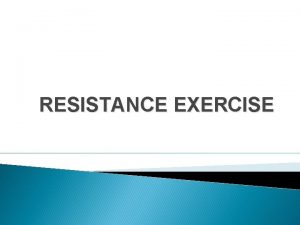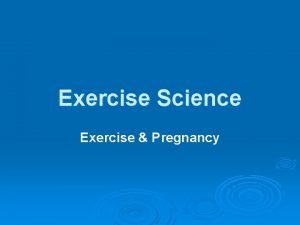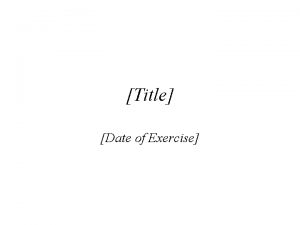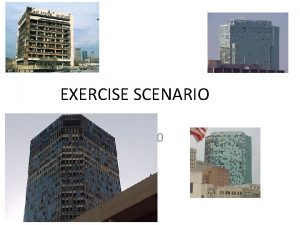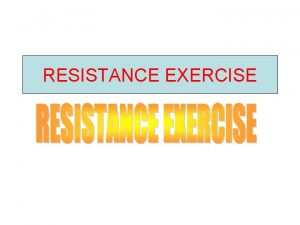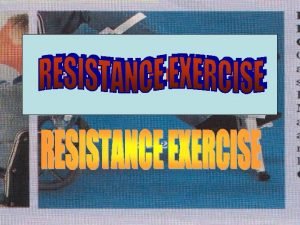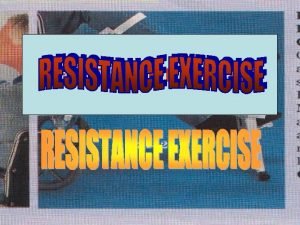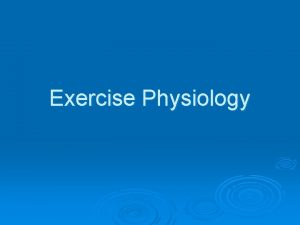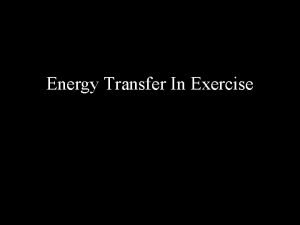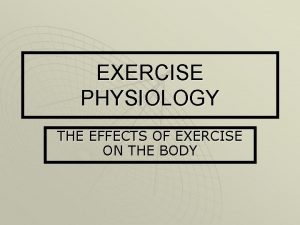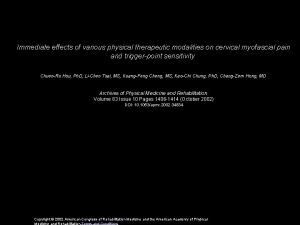IMMEDIATE EFFECTS OF EXERCISE Immediate effects of exercise













































- Slides: 45

IMMEDIATE EFFECTS OF EXERCISE

Immediate effects of exercise Color changes

Immediate effects of exercise Blood moves to skin surface for heat regulation

Immediate effects of exercise Shunting of blood to working muscles

Immediate effects of exercise Salt loss

Immediate effects of exercise Heart rate increases

Immediate effects of exercise Stroke volume increases

Immediate effects of exercise Cardiac output increases

Immediate effects of exercise Sweating / water loss occurs

When you exercise or take part in a strenuous sport you will notice several changes taking place in your body: 1. Your heart beats stronger and faster 2. Your breathing quickens and deepens 3. Your body temperature increases 4. You start to sweat 5. Your muscles begin to ache

1. YOUR HEART BEATS STRONGER AND FASTER During exercise it is mainly ADRENALINE that produces changes in the heartbeat. Adrenaline is a hormone which causes the heart rate to quicken.

2. YOUR BREATHING QUICKENS AND DEEPENS You breathe quicker so as to get more oxygen into the lungs. An efficient heart can then transport this to the working muscles. Training can be of great benefit to the Respiratory System. The capacity of the lungs is increased, which allows more oxygen to be taken in per breath.

3. YOUR TEMPERATURE INCREASES When we exercise, our muscles are working and they generate heat, so our body temperature rises. Body temperature is regulated by heat radiating from the skin and water evaporating by sweating. When we shiver, our muscles are working to produce heat in order to raise our body temperature.

4. YOU START TO SWEAT As we have just seen, some of our energy is turned into heat. The body will tolerate a small rise in temperature, but very soon we begin to sweat. If conditions are hot, we sweat more and produce less urine. We also lose salt as well as body heat and water.

4. YOU START TO SWEAT We have to replace the salt so that the body stays the same, otherwise we will get cramps. It is now common to see drinks being taken during football, tennis, cycling and many other games that go on for a long time, in which competitors sweat a lot. This prevents DEHYDRATION.


5. YOUR MUSCLES BEGIN TO ACHE As we now know, in order to work, muscles need energy. Energy comes from food, which is mainly converted to GLUCOSE (sugar). To work more efficiently muscles also need plenty of oxygen. Glucose and oxygen are brought to the muscles in the blood.

5. YOUR MUSCLES BEGIN TO ACHE Wastes such as carbon dioxide are carried away in the blood. This process of getting energy is called RESPIRATION. Glucose + Oxygen = Energy + CO 2 + Water

5. YOUR MUSCLES BEGIN TO ACHE When muscles do extra work more Glucose and Oxygen are needed, so more blood must flow to the muscles. So the heart beats faster. Eventually it becomes impossible to get enough oxygen to the muscles, so they use a different method of getting energy.

5. YOUR MUSCLES BEGIN TO ACHE Glucose is still used, but now there is a waste product called LACTIC ACID. Lactic Acid is a poison, After a while it will make the muscles ache, and the muscles will stop working. The athlete has to rest while the blood brings fresh supplies of oxygen to the muscles.

How the Body changes during exercise. During exercise, cell respiration in your muscles increase. So the level of carbon dioxide in your blood rises

How the Body changes during exercise. Your brain detects this. It sends a signal to your lungs to breathe faster and deeper.

How the Body changes during exercise. So gas exchange in your lungs speeds up. More carbon dioxide passes out of the blood and more oxygen passes into it.

How the Body changes during exercise. The brain also sends a signal to your heart to beat faster. Your heart rate goes up.

How the Body changes during exercise. Your muscles squeeze on veins, sending more blood back to the heart. This makes stroke volume rise.

How the Body changes during exercise. So cardiac output rises too. More blood gets pumped to the muscles each minute.

How the Body changes during exercise. This means more oxygen reaches the muscles each minute and more carbon dioxide is carried away.

How the Body changes during exercise. Arterioles widen so that your blood pressure won’t get too high.

How the Body changes during exercise. Blood get shunted from where it is less needed to where the action is. For example from your gut to your legs.

How the Body changes during exercise. The exercise generates heat. So your blood gets hotter. More blood is shunted close to the skin to cool down. This makes your skin redden.

How the Body changes during exercise. You sweat, which cools you by evaporation.

What happens to the Body during exercise and why? Oxygen inhaled regularly for aerobic respiration; tidal volume increases.

What happens to the Body during exercise and why? Air exhaled to stop the build-up of carbon dioxide.

What happens to the Body during exercise and why? Breathing rate increases and becomes deeper and more regular = aerobic respiration.

What happens to the Body during exercise and why? Heart beat increases, supplying the demand for more oxygen in the working muscles

What happens to the Body during exercise and why? Stroke volume increases as the heart sends out more blood per beat.

What happens to the Body during exercise and why? Blood flow reduced to areas not in use, like the digestive system.

What happens to the Body during exercise and why? Fatigue in muscles, as ability to use oxygen for the production of energy becomes less efficient.

What happens to the Body during exercise and why? Blood moves to skin surface, helping heat loss.

What happens to the Body during exercise and why? Gaseous exchange in alveoli - with training the gaseous exchange becomes more efficient as more alveoli are prepared to take on the exchange of oxygen and carbon dioxide.

What happens to the Body during exercise and why? Waste water released from the body as sweat on surface of the skin.

What happens to the Body during exercise and why? Release of energy glycogen is stored in muscles and the liver and released as glucose to allow the muscles to work.

What happens to the Body during exercise and why? Adrenaline (a hormone) released preparing the body for action.

EFFECTS OF REGULAR TRAINING AND EXERCISE 1. The heart pumps more blood per beat. 2. The recovery rate becomes quicker. 3. The resting pulse rate becomes lower. 4. The number of capillaries increases.

LONG TERM BENEFITS OF EXERCISE 1. It reduces the risk of coronary heart disease 2. You can work harder for longer Exercise improves the Cardiovascular System and helps to reduce blood pressure. It helps to reduce stress and burn off excess calories
 Immediate effects of exercise
Immediate effects of exercise What were the immediate effects of reconstruction
What were the immediate effects of reconstruction Long term effects of exercise on skeletal system
Long term effects of exercise on skeletal system Perpetuity immediate formula
Perpetuity immediate formula Has an immediate and profound effect on a design
Has an immediate and profound effect on a design Immediate addressing mode in 8086
Immediate addressing mode in 8086 Hlt addressing mode
Hlt addressing mode Database recovery techniques
Database recovery techniques Absolute power corrupts absolutely
Absolute power corrupts absolutely What is speaker in soapstone
What is speaker in soapstone What was an immediate cause of the 1789 french revolution
What was an immediate cause of the 1789 french revolution Apa itu direct addressing
Apa itu direct addressing An immediate and temporary care to a person
An immediate and temporary care to a person The immediate cause of ww1
The immediate cause of ww1 Immediate predecessor in project management
Immediate predecessor in project management Immediate memory
Immediate memory Immediate rpd
Immediate rpd Apgar score meaning
Apgar score meaning The effects of the french revolution
The effects of the french revolution ........ is an alternative of log based recovery.
........ is an alternative of log based recovery. Ter thin client
Ter thin client Immediate constituent analysis
Immediate constituent analysis Blended family advantages and disadvantages
Blended family advantages and disadvantages Main long term & immediate causes of wwi
Main long term & immediate causes of wwi American pathway immediate annuity
American pathway immediate annuity Perpetuity immediate formula
Perpetuity immediate formula Future tense of wear
Future tense of wear Immediate assistance
Immediate assistance Five principles of design
Five principles of design Immediate phase
Immediate phase Purpose of immediate newborn care
Purpose of immediate newborn care Five initial steps of newborn care
Five initial steps of newborn care Ia drills
Ia drills Four phases of the french revolution
Four phases of the french revolution Lincoln johnson
Lincoln johnson Immediate settlement formula
Immediate settlement formula Immediate family meaning
Immediate family meaning Definition of immediate family
Definition of immediate family Lmc addressing modes
Lmc addressing modes Immediate memory test
Immediate memory test Immediate jeopardy plan of removal
Immediate jeopardy plan of removal It has an immediate and profound effect on design.
It has an immediate and profound effect on design. Immediate annuity formula
Immediate annuity formula Remove left recursion example
Remove left recursion example Direct experiences examples
Direct experiences examples Transfusion en urgence vitale immédiate
Transfusion en urgence vitale immédiate
